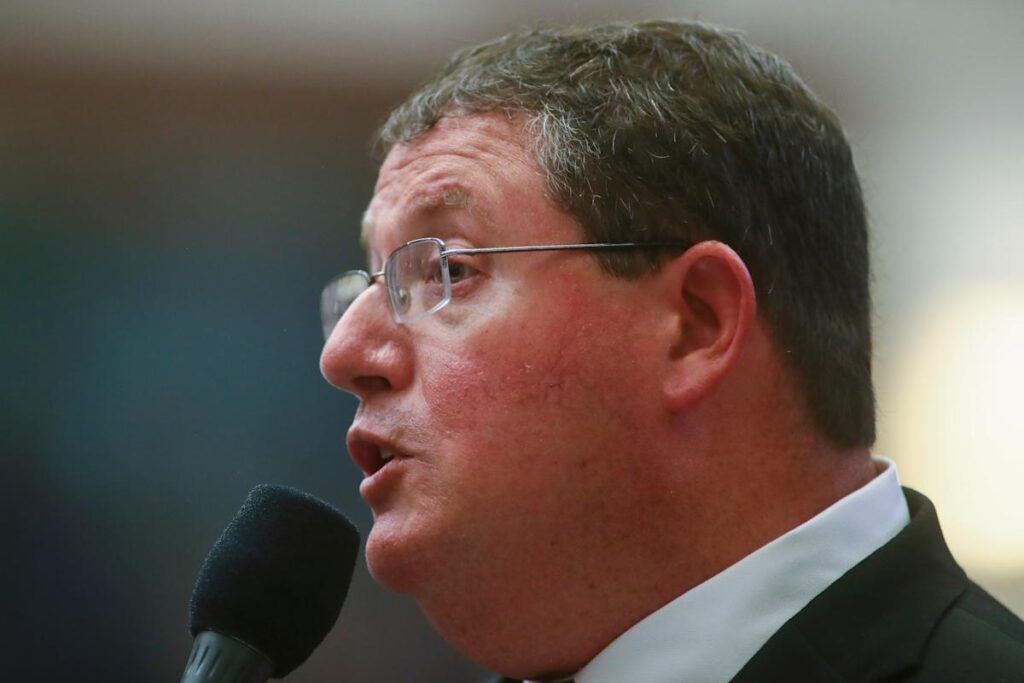A Florida pair of House special elections on Tuesday is the earliest chance Republicans have to build on their fragile majority — and one Democrats see as an early voter litmus test of President Donald Trump’s second term.
The races are taking place in Trump’s adopted home state, the source of numerous White House officials. Florida voters supported Trump all three times he ran for president. Democrats — who’ve been all but stomped into irrelevancy there — have been trying to regain their footing, knowing the state’s electoral importance will only grow stronger with projected future population shifts.
The newest chance: Florida’s 6th District, where recent polling shows a tight race. Predictions of an easy Republican win quickly evaporated in the closing weeks of the campaign, bringing in loads of interest, dollars and surrogates.
Democrat Josh Weil has brought in $10 million in largely out-of-state cash from small-dollar donors. Trump, meanwhile, endorsed Republican state Sen. Randy Fine in the district, which he won by more than 30 points in November.
“There’s no such thing as a perpetual red district or a perpetual blue district,” Democratic National Committee Chair Ken Martin said after canvassing in the district over the weekend. “Everything’s in play.”
The seat became available when Mike Waltz resigned to become Trump’s national security adviser. As the race became a heated topic of conversation in Washington, Waltz himself was also making headlines after accidentally adding The Atlantic’s editor-in-chief to a sensitive group chat discussing attack plans in Yemen.
Party turnout on Monday showed Republican early voters outnumbered Democrats by roughly 25,000 people. But another 27,000 voters who were registered as neither Republican nor Democrat had either voted by mail or voted early in person. Fine predicted he would be “fine” and held numerous interviews with conservative commentators in the campaign’s final days, as well as town halls over the phone with Trump and Rep. Byron Donalds, a Trump-endorsed 2026 gubernatorial candidate.
“This is a turnout election, and if our side turns out, we will win,” Fine said in an interview last week. “It’s that simple, because there’s so many more of us. This isn’t a swing seat. If the Trump army turns out, I’ll win, and I think they will.”
The other Florida open seat, in the 1st District, became available after Rep. Matt Gaetz resigned for a short-lived bid at becoming Trump’s attorney general. It’s a safe Republican district where Trump won 68 percent of the vote in November.
The Trump-endorsed candidate, Jimmy Patronis, has been the state’s chief financial officer since 2017, winning election twice statewide. Patronis easily won the GOP primary over nine other candidates, but he has been significantly outraised by Democrat Gay Valimont, who has used her cash advantage to air TV ads. Valimont, a gun control activist, has criticized Patronis for living outside the district and criticized him over the state’s property insurance crisis due to his key role in regulating the industry.
But Valimont has also hit Patronis over federal spending cuts to the agency that helps veterans, a potential factor in a district with several major military installations. Patronis, meanwhile, has leaned into the Trump endorsement and aired an ad that says Valimont hates Trump.
Florida carries outsize influence in Congress with its 28 House seats — 18 of which are GOP-held. Republicans are already operating under tight margins in the House given the two vacancies and want every vote they can get to help move Trump’s agenda.
Democrats running in the special elections have accused Trump of wanting to cut Social Security in senior-heavy Florida, even though he has promised not to, and focused their messaging on going after federal cuts pushed through by Elon Musk’s federal workforce cuts.
Democrats are feeling encouraged by strong performances in recent special elections elsewhere, pointing to how Trump withdrew his U.N. ambassador nomination for Rep. Elise Stefanik (R-N.Y.) last week amid nervousness about House voting numbers.
“That election clearly sent shivers down their spines, and it scared them shitless to the point now that Donald Trump and the Republicans are running scared,” Martin said, referring to a recent headline-grabbing Pennsylvania state Senate win by Democrats. “So every Republican in Florida should wake up and pay attention right now, because Democrats are not feeding any more ground to you.”
Special elections can be aberrations, given that they are low-turnout elections that can swing differently than those in a typical election year. Both districts are historically reliably red.
Gov. Ron DeSantis has largely stayed out of both races, but he made his disapproval about Fine clear publicly, saying he — and not Trump — was to blame for what appeared to be a close race.
The two had a falling out after Fine switched his endorsement during the 2024 presidential primary from DeSantis to Trump. Fine, however, said he didn’t hold ill will toward the governor and thought he was successful. The attacks in the race he saw were largely geared toward the president.
“They’re about stopping President Trump, taking control of Congress, ending and impeaching Trump,” Fine said. “This is an election about the Trump agenda, not Randy Fine versus Josh Weil.”
Kimberly Leonard reported from Miami. Gary Fineout reported from Tallahassee.
Read the full article here


